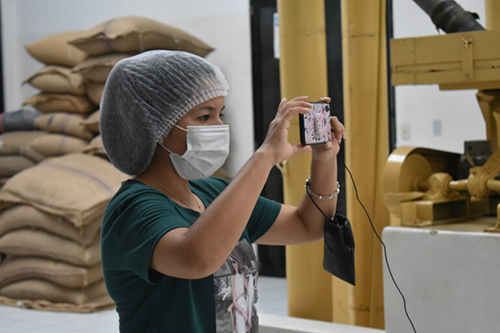
On August 12, 2024, NCBA CLUSA celebrates International Youth Day. NCBA CLUSA has long supported youth development across the globe, implementing a Positive Youth Development (PYD) approach to engaging youth in building their economic livelihoods. This International Youth Day, we are highlighting some of our programs and their successes in empowering youth.
Democratic Republic of the Congo (DRC): USAID Tudituale
NCBA CLUSA supports the five-year USAID Tudituale project in DRC (from 2023-2028), led by CRS, to improve food, nutrition and economic sustainability in rural households. As DRC’s median age is 17, empowering youth is essential for the success of this initiative. Currently, NCBA CLUSA is conducting a Youth Market Assessment to identify challenges and opportunities for engaging youth in economic activities. This assessment uses an intersectional approach, acknowledging that youth are not a homogenous group and that youth of different genders, ages, ethnicities and disability status will have different experiences and challenges in engaging in the marketplace. In addition, NCBA CLUSA is implementing a participatory approach, engaging youth and key stakeholders at every step of the assessment to identify key opportunities that youth of all identities can participate in and contribute to their economic security.
Ecuador: USAID Recycling, Adapting, Developing, Adjusting and Renovating (RADAR)
In 2024, NCBA CLUSA launched the five-year USAID RADAR project with the goal of improving solid waste management systems to promote financial, social and ecological sustainability in the provinces of Manabí and Galápagos. A key pillar of achieving the project goals will be to ensure the inclusion of all underserved populations, including women, youth and people with disabilities. The project recently completed a comprehensive gender and social inclusion analysis and action plan to identify ways to engage all people, especially youth, in the economic opportunities presented by the project. The approach will ensure that youth are not just included but economically empowered by engaging in the circular economy, covering every step of the solid waste value chain that incentivizes environmentally responsible production and consumption, to create a better future for themselves and the planet.
Global: USAID Cooperative Development Program: Cooperative Ecosystems and Social Inclusion (CESI)

NCBA CLUSA’s USAID-funded CDP CESI program supports cooperative capacity building and the cooperative enabling environment through the lens of gender and youth inclusion in Guatemala, Peru, Madagascar and Kenya. At the end of 2023, the project conducted a Youth Analysis to better understand the challenges and opportunities for engaging youth in cooperatives. A key finding from the analysis was that youth are a significant asset to cooperatives because their innovation and digital skills can enhance internal cooperative operations. This finding is consistent with other project activities and examples from around the world where youth are leading digital adoption and innovation. For example, at ICT4Ag 2024, NCBA CLUSA presented on the Cooperative Business School (CBS), an online platform that provides cooperative training and resources to individuals in the U.S., Guatemala and Peru. In launching the CBS platform, the CDP team found that youth were a gateway to increasing engagement as they were able to use their digital skills to teach their family and community members how to access the platform and its training and resources.
Timor-Leste: USAID Women and Youth Creating Our Future (WYCF)
NCBA CLUSA leads the five-year USAID-funded WYCF project in Timor Leste, designed to provide job skills training and increase employment among women, youth and people with disabilities across the country. WYCF provides training through three Youth Hubs—in Dili, Bobonaro (Maliana) and Baucau—on foundational skills, employment and entrepreneurship, providing youth with the skills to secure employment or start their own businesses. Beyond in-person training, WYCF is capitalizing on the opportunities created by digitization and is providing mobile training to youth, reaching students in all 13 districts across the country. While still in its first year of implementation, WYCF has already provided training to more than 1,000 youth and facilitated youth securing full-time formal employment.


